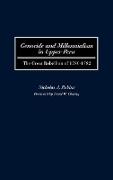Genocide and Millennialism in Upper Peru
BücherAngebote / Angebote:
Exploring one of the least-studied genocides in post-conquest South America, Robins calls into question many of the central assumptions currently held by genocide scholars. Victims of genocide usually lack the organization and weaponry to effectively battle their enemies. During the Great Rebellion the Indian revolutionaries faced the better-organized and armed loyalist army. Where as genocidal policies are usually characterized by centralized leadership, the 1780-1782 Great Rebellion in Peru and Upper Peru (now Bolivia) was highly fragmented and confederational in nature, thus undercutting the widely-held assumption that only the State is capable of committing genocide. The Rebellion is one of the rare cases when the intended victims of genocide emerged victorious.
Folgt in ca. 15 Arbeitstagen
